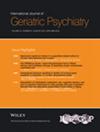Stigma Beliefs and Attitudes Against Dementia and Help-Seeking Intentions in Hypothetical Early Signs of Dementia: An Observational Cross-Sectional Study of Middle-Aged and Older Adults in Japan
Abstract
Objectives
People's stigma toward dementia may hinder support and care in early dementia. We explored the association of stigma beliefs and attitudes toward dementia with help-seeking intentions among middle-aged and older adults in hypothetical early signs of dementia.
Methods
This cross-sectional study involved individuals aged 40 years and above without dementia, recruited from public facility visitors in Aichi, Japan, between July and August 2024. Dementia stigma was assessed using a short form of the Phillipson Dementia Stigma Assessment, comprising four domains: personal avoidance (avoiding contact and interaction with people with dementia), fear of labeling (fear and anxiety regarding dementia diagnosis), person-centeredness (respect and positive attitudes toward people with dementia), and fear of discrimination (fear of ostracism because of dementia). The participants were asked about their help-seeking intentions from family members, other relatives, healthcare professionals, public facilities, and the phone helpline during the hypothetical early signs of dementia.
Results
Data from 380 individuals were analyzed (mean age 75.0 years; 76.1% women), of whom 90.4% had help-seeking intentions from a partner, 85.9% from children, and 85.8% from healthcare professionals. Multivariable regression analysis revealed that higher dementia stigma was associated with a lower likelihood of help-seeking intentions from a partner, children, and healthcare professionals. Of the subdomains, fear of discrimination was negatively related to help-seeking intentions.
Conclusions
This study indicated that people's stigma beliefs and attitudes may pose barriers to help-seeking in the early stage of dementia. Our findings highlight the need to strengthen support for individuals with early dementia, while reducing people's fear of discrimination and prejudice against dementia in the long term.

 求助内容:
求助内容: 应助结果提醒方式:
应助结果提醒方式:


